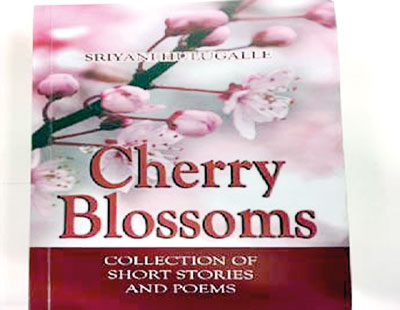Both unique and universal, these stories exude nostalgia
View(s): In Cherry Blossoms, Sriyani Hulugalle captures the story of unique life events. Sri Lankans who grew up in the tumultuous decades from the 70s through the new millennium will be able to relate to most of the broad themes. What initially feels as a collection of random stories becomes interwoven by the broadly relatable themes of love, loss and nostalgia.
In Cherry Blossoms, Sriyani Hulugalle captures the story of unique life events. Sri Lankans who grew up in the tumultuous decades from the 70s through the new millennium will be able to relate to most of the broad themes. What initially feels as a collection of random stories becomes interwoven by the broadly relatable themes of love, loss and nostalgia.
Nostalgia is a strong human emotion. Both “restorative” and “reflective” nostalgia have been well explored in these stories. According to Svetlana Boym (author of The Future of Nostalgia), restorative nostalgia seeks to fill in memory gaps to rebuild our lost home (‘nostos’ meaning returning home); while reflective nostalgia “dwells in algia (aching), in longing and loss, the imperfect process of remembrance .
The 25 stories whirl from one place to another, shift locations and time, and skip from conversation to prose – but they are bound by nostalgia. Hulugalle has a vivid imagination – easily demonstrated by a look at the medley of characters that make up the heroes, heroines and villains of each of the stories.
The book opens with the title story about a chance encounter in a foreign land of two people who are interested in each other, but held back by circumstances. A chance encounter later gives the two a second chance and the reader is left guessing whether they take it.
In ‘Gone are the days’ the author fully exposes her style in bringing together the two types of nostalgia- where the plot revolves around an encounter at a reunion at the University of Peradeniya of two former batch mates who were romantically involved. For Shammi it’s restorative to think about coming home while for Pavan it’s reflective and a cloud of ‘what could have been’ is finally lifted in the end.
‘No heart is free’ is a top down view of Sri Lankan society through the harrowing conflict years. Through the protagonist, the story captures the difficulties of divided loyalty of ethnicity and friendship. Fighting one’s political beliefs against self-interest and loyalty to family is brought to bear through the intriguing characters of Raju, his sister Gowrie and a little girl Neesha. A bond Raju develops with Neesha would bring to a head a difficult choice that would have unfortunate consequences.
“Tree changers” – individuals who opt to give up a depressing city life for a more relaxed and less consumerist village life is also a narrative woven through various characters in the book. In ‘Beyond My Reach’, for instance, we learn about a grandmother trying to understand how the lives of her three children have taken such divergent life paths. This is a tale all too familiar for many grandparents today. One child is overseas; the other is too busy in Colombo, but to the surprise of the reader the third in this case is living a full life in a rural setting – which leads to the ultimate philosophical question of who amongst the three is happiest? Disposition, inertia and simplicity all become key components in our understanding of happiness.

Sriyani Hulugalle organises Cherry Blossom in such a way that we can reflect on it from a distance, experience it anew and deny the transient nature of the everyday. The stories let us press pause, rewind, zoom in, zoom out; they create a space for us to think of ourselves and our world in novel ways – to be titillated, frightened, disgusted, amused and surprised – often at ourselves – and meaningfully.We’re evolutionarily hardwired to look for patterns, for meaning; we crave narrative. This is a hindrance when unchecked but it’s also an incredible gift. The quality of fiction in Cherry Blossoms brings you to places, emotionally and imaginatively, which you never otherwise would have visited. The psychologist Steven Pinker wondered once that, maybe, fiction is a kind of empathy technology – which is definitely the case with this collection of stories and poems.
Cherry Blossoms is a wonderful exploration of life as seen by urbane Sri Lanka, of the travails the country lived through as it evolved through four decades of violent revolution and reinvention. It’s a universal story with uniquely Sri Lankan characteristics, brought to life by an engaging author who has been able to place it through the eyes of a well- travelled internationalist. Cherry Blossoms presents a unique blend of a world view that is both about individual liberty and our duty to broader society.


